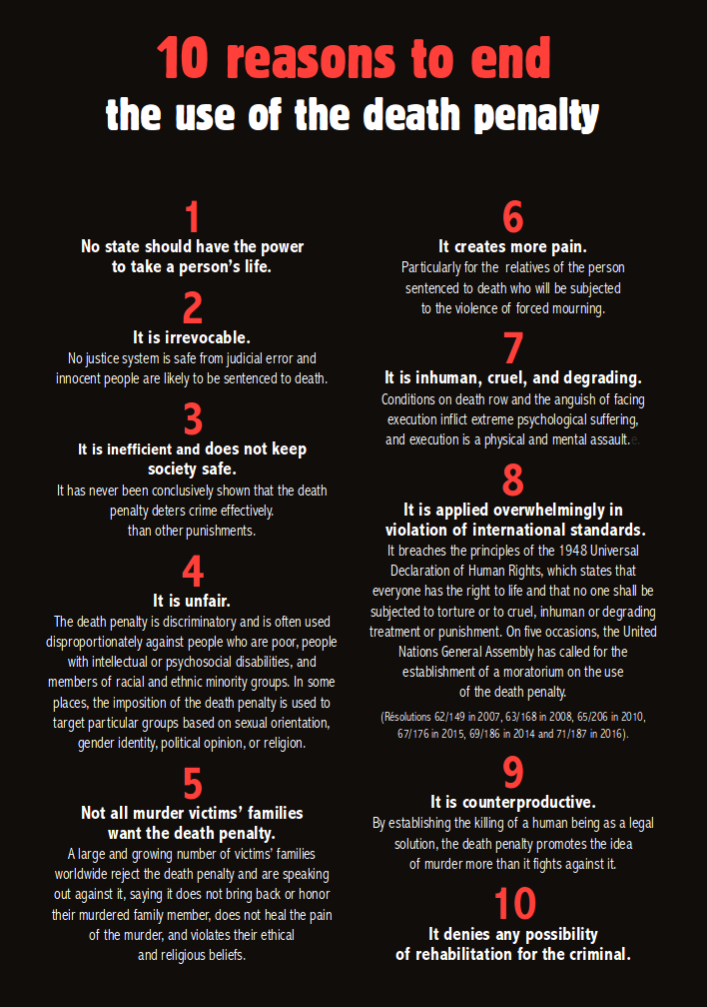The death penalty
Learn more about arguments against the death penalty
Become a member
Everyone has the right to life, liberty and security of person.
No one shall be subjected to torture or to cruel, inhuman or degrading treatment or punishment.
Arguments against the death penalty
The death penalty is a human rights violation.
The death penalty violates a fundamental and unalienable human right – the right to life.
The death penalty is cruel, inhumane and barbaric.
The death penalty is an archaic form of punishment, which has no place in the 21st century.
The death penalty has no deterrent effect.
There is no credible evidence that the death penalty deters crime more effectively than long terms of imprisonment. States that use the death penalty do not have lower rates of violent crime than states without the death penalty.
The death penalty is very expensive.
Death penalty cases are up to 10 times more expensive than comparable non-death penalty cases. The higher costs are mostly due to a longer trial and appeal process required when a person’s life is on the line, and higher costs of incarceration.
The death penalty is irreversible.
The death penalty carries the risk of executing an innocent person. Since 1973, more than 170 people who had been wrongly convicted and sentenced to death in the U.S. have been exonerated. Evidence also shows that innocent people have been executed.
The death penalty takes away all prospect for rehabilitation.
A death sentence denies the right to rehabilitation. The offender gets no opportunity to show regret and to do better in the future. The offender has nothing to lose and can therefore even become a danger for fellow inmates and prison guards.
The death penalty is unfairly applied.
People belonging to minority groups, the poor and the mentally ill are much more likely to be sentenced to death for similar crimes.
The death penalty is revenge, not justice.
It makes no sense to kill someone in order to show that killing is wrong.
“To take a life when a life has been lost is revenge, it is not justice.” Archbishop Desmond Tutu
The death penalty has a brutalizing effect on society – violence creates violence.
Statistics show that the death penalty leads to a brutalisation of society and an increase in murder rate.
The death penalty is unnecessary.
Alternative punishments exist. Countries that abolished capital punishment have shown that society can be kept safe without the death penalty.
The death penalty has negative effects on execution teams.
The death penalty can have damaging effects on those who have to carry out executions. Members of execution teams often develop mental problems. The experienced stress and guilt can lead to a wide range of mental-health consequences.
There is no such thing as a “humane” execution.
An execution is per definition a violent act. Several botched executions in recent years have shown that even lethal injection is not impeccable and can go terribly wrong.
The death penalty provides no closure for victim families.
A death penalty trial prolongs the pain for victims’ families, dragging them through an agonizing and lengthy process, instead of helping them heal. Furthermore, not all families are in favour of the death penalty. Their wishes and needs are often ignored.
The death penalty ignores the pain experienced by the offender’s family.
Family and friends of those sentenced to death are victims too. The death penalty has a devastating impact on such families, particularly on children. They experience trauma and isolation, which can lead to mental-health and behavioural issues.

